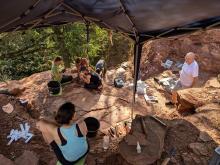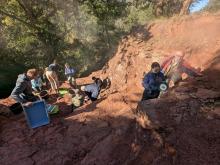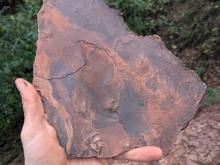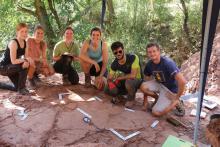Three TUBAF students are taking part in an excavation project near Eisleben in Saxony-Anhalt. Together with Emeritus Professor Jörg Schneider, they are bringing to light a world that looked very different around 260 million years ago than it does today. The large number of different fossils that came to light during the summer excavations is unique in Europe. The international team will be back in the Eisleben area in August and September 2025. Students who would like to take part in the excavation internship can already excavation [dot] wolferode [at] gmail [dot] com (register with the team).
"Today, the permeable quarry where we are digging is surrounded by forest and fields. Back in the Permian period, the region around the Lutherstadt Eisleben, which is now characterised by forest, fruit trees and agriculture, was a flat depression in a steppe and desert landscape. Daytime temperatures were very high, while at night they could drop below freezing point, as in today's desert regions. These temperature fluctuations are also reflected in the rock, as we found both salt crystal marks and ice crystal marks. The vegetation was sparse and shallow pools and lakes only formed during the rainy season. In their surroundings lived small prehistoric dinosaurs and a variety of arthropods, whose footprints and, in some cases, body impressions we found." describes Jenny Buchholtz, a student on the Master's degree programme in Geosciences (4th semester).
"Using pickaxes and shovels, hammers, chisels and brushes, we uncovered the tracks of dinosaurs and arthropods as well as the body impressions of fossil dragonfly larvae and freshwater jellyfish," explains Vanessa Grießbach, a student on the Bachelor's degree programme in Geosciences, 3rd semester. "Communication and teamwork are an advantage in all areas of life. During this excavation internship, I felt and learnt that the open communication, strong team spirit and fantastic atmosphere made the hard work a lot easier. I learnt the technique of how to excavate one layer without destroying the next and found many fossils. It amazed me how careful you have to be. It was a great experience and I learnt a lot."
Multi-day assignment for international team
For almost two weeks, a total of seven students from the universities of Pisa/Italy, Bonn/Germany, Freiberg/Germany and Cork/Ireland were out and about in the quarry with their tools. They were accompanied by TUBAF alumni and excavation leaders Daniel Falk (PhD student at University College Cork, Ireland), Dr Michael Buchwitz (Museum für Naturkunde Magdeburg) and Emeritus Professor of Palaeontology Jörg Schneider from TU Bergakademie Freiberg. Volunteers such as Rohland Möhring (Museum für Naturkunde Magdeburg) also actively supported the work.
"To be honest, I was initially quite unsure whether my English was good enough. It was my first excavation, and then in an international team. But when it started, it was fun from the very first minute. I really broadened my professional horizons. The international dinners in the shared accommodation were also a lot of fun and gave me a little insight into the different cultures," reports Anna-Marie Schmidt, 3rd semester on the Bachelor's degree programme in Geosciences.
Anna Schöneberger, a student at the University of Bonn, also emphasises the collaboration with international students. "You learn an incredible amount from each other and friendships are formed that last beyond the excavation. I'm already looking forward to next year." Anna is currently writing her master's thesis on dinosaur tracks and was still fully committed to the project. "We are learning to understand the conditions under which such sediments are formed. Field and excavation practicals show us how rocks that we otherwise only know from the drawers of the teaching collection are really related to each other and to certain formation spaces and formation conditions. These practical experiences are also highly regarded in the professional world," she adds.
"Anything is possible here now"
The team describes the work as the first major systematic palaeontological excavation in the so-called Hornburg Formation of the latest Rotliegend in Germany. "We didn't expect so many finds this year - especially the large slabs with insect and dinosaur tracks. We have also found fossils of which there was previously no evidence in the area. That's marvellous! It allows us to get a picture of the prehistoric ecosystem," says doctoral student Daniel Falk, one of the initiators of the excavation.
The native of Brandenburg was already fascinated by palaeontology as a child and studied Applied Palaeontology and Stratigraphy at TUBAF from 2008 to 2014. He is currently completing his doctorate in Ireland.
As the fossil finds prove, the shallow ponds were full of life despite the adverse environmental conditions: "Many a track maker slipped on the wet and deformable clay layers or sank deep into them. The pools were also home to thousands of small freshwater jellyfish, whose footprints can also be found. Bone finds have not yet been confirmed, but cannot be ruled out entirely. Anything is now possible here!" notes Dr Michael Buchwitz optimistically. Buchwitz is a specialist in dinosaur tracks and deputy director of the Museum für Naturkunde Magdeburg. He studied geology in Freiberg from 2001 to 2007 and completed his dissertation in palaeontology in 2011, also in Freiberg.
Further excavations planned
"The fossils are unique in Europe," says Prof Dr Jörg Schneider enthusiastically. The excavation is also exciting for budding scientists: "Students can learn a lot about sedimentology and palaeontology in the quarry and also complete Master's theses (excavation [dot] wolferode [at] gmail [dot] com (contact for interested students)).
Around 80 boxes containing finds from the excavation expedition were delivered to the Museum für Naturkunde Magdeburg in September. The finds will be prepared and analysed there. The international team will be back in the Eisleben area in August and September 2025. The researchers then hope to gain new scientific insights into the behaviour of the prehistoric animals that left behind the trace fossils. It will also be possible to estimate the age of the analysed rock layers more precisely in future.
The excavation team would like to thank the landowner Dipl.-Ing. FH Jürgen Waschkuhn, University College Cork and the Museum für Naturkunde Magdeburg, the Landesamt für Geologie und Bergwesen Sachsen-Anhalt and the Irish Research Council for their support.





